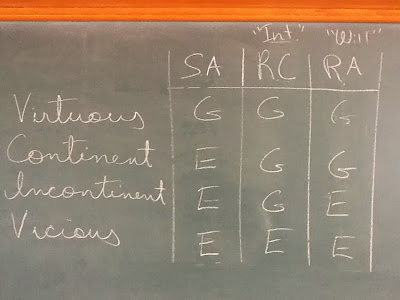Quaeritur: Reading more of Fenton's writings, I am becoming slightly confused... In several places he emphatically shows that the Church is a visible society, and that there is not an invisible Church, and thus that membership in the Church means something visible, and not invisible.
And yet, he also states that the Catholic dogma is not that one must be a member in order to be saved, only that one must be in some way within the Church; and that it is possible to be within the Church without actually being a member, if one has an implicit desire (hence baptism by desire or by blood).
My question is this: how can we say that even implicit desire makes one within the Church if the Church is a visible society? If you can be in the Church by some way other than visible membership, doesn't it follow that one can be in the Church invisibly?
I'm having a hard time seeing how Fenton doesn't contradict himself.
 Respondeo: The Church, in addition to being the Mystical Body of Christ, which is primarily a supernatural, invisible reality, is also and secondarily a visible society, with a visible structure and hierarchy, visible worship, etc. And hence those of us who participate fully in this visible society are said to be its visible members.
Respondeo: The Church, in addition to being the Mystical Body of Christ, which is primarily a supernatural, invisible reality, is also and secondarily a visible society, with a visible structure and hierarchy, visible worship, etc. And hence those of us who participate fully in this visible society are said to be its visible members.
Now someone who is in the state of grace and through no fault of his own is outside of its visible structure can be said to 'belong' to the Church invisibly, without being a visible member through its worship, government, etc. Being a member is much more than belonging. The latter implies somehow mystically participating in the Mystical Body of Christ (being branches of the vine), whereas the former implies also participating in the visible structure of the Church.
For example, a child who is baptized in a Protestant church is invisibly in the state of sanctifying grace and hence belongs to the Mystical Body, but does not visibly profess the Catholic faith, does not visibly attend Catholic worship, and is not part of the hierarchical and legal structure of the Church (e.g., is not bound by canon law).
I remember the pictures in the Baltimore Catechism (St. Joseph's edition): a boat with people in it (visible members) and some people out in the water hanging on to ropes attached to the boat, who are surviving thanks to the fact that they are still hanging on to the boat. Analogously you could say that some are members of the Mystical Body, whereas others merely 'belong' to the Mystical Body (participate in its saving nature) without being members. A picture that is really worth a thousand words.
For more on this, I recommend Fr. Romanus' three-part article on Church membership, which goes more technically into the relevant distinctions as presented by the majority of the Church's classical theologians.





.jpg)













